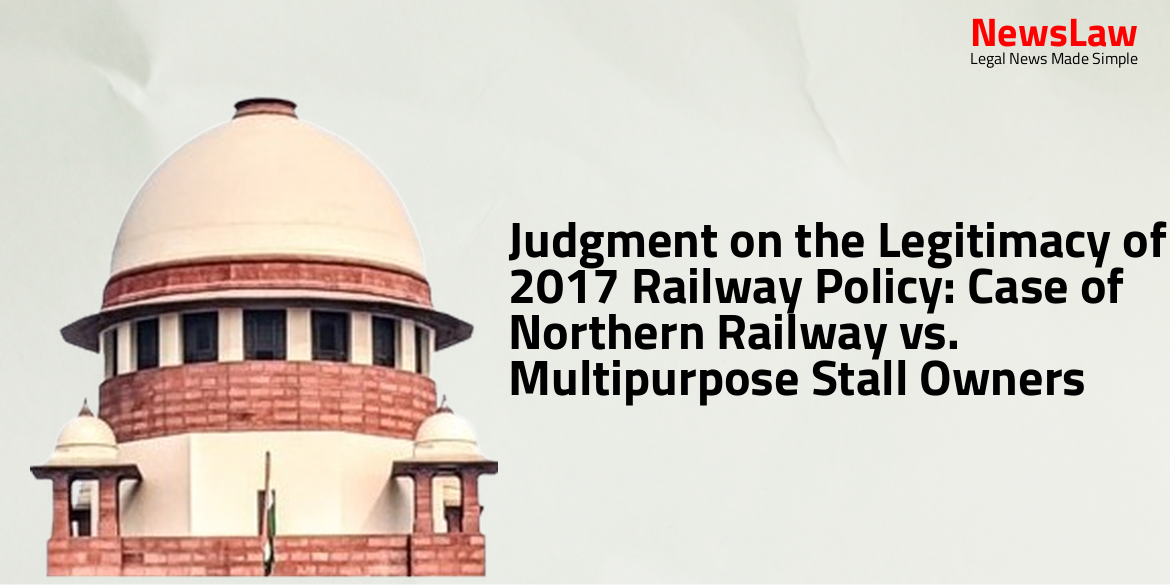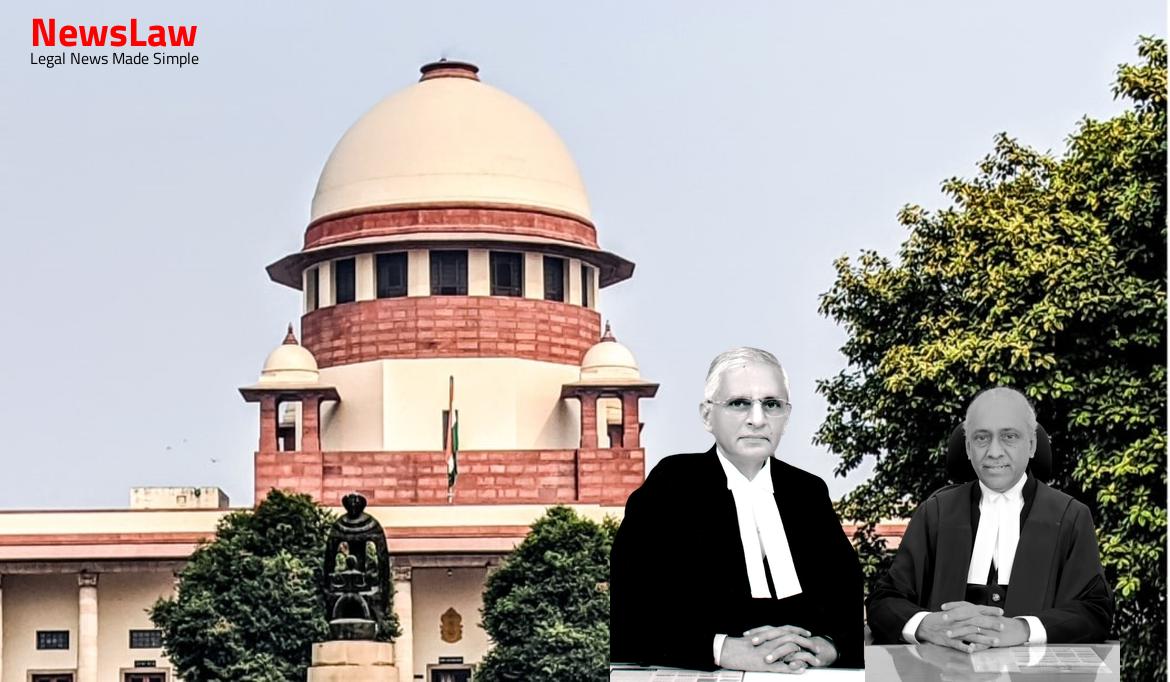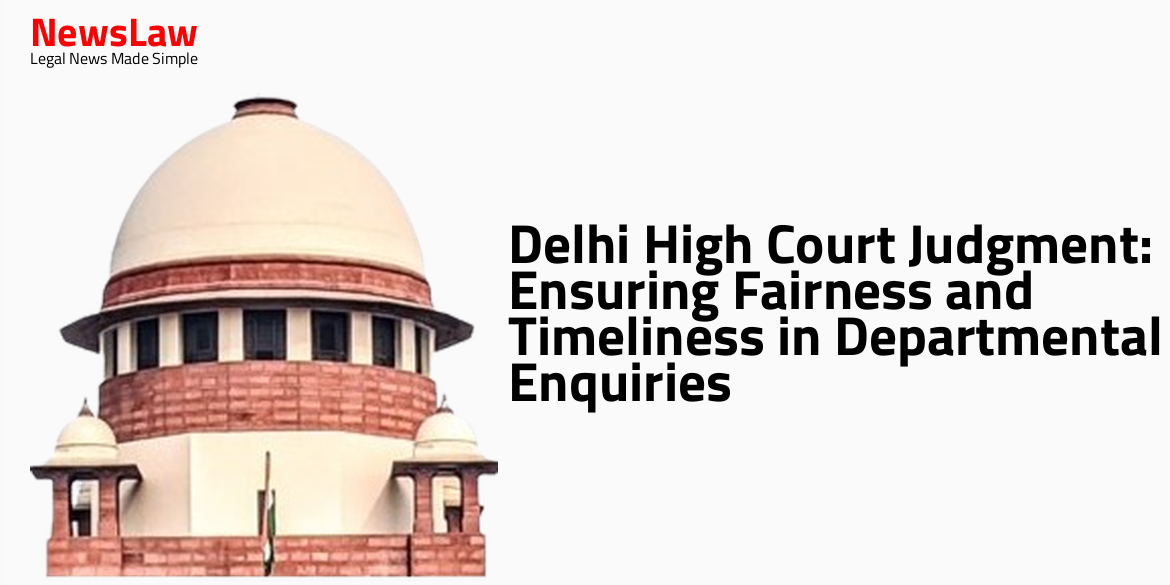Explore the detailed analysis of the case between Northern Railway and Multipurpose Stall Owners regarding the 2017 Railway Policy. Delve into the intricacies of the judgment and its impact on stakeholders in the railway catering and vending sector.
Facts
- The petitioners were directed to vacate their MPS on 27.02.2023 due to force majeure event i.e., Covid-19 lockdown.
- Petitioner no.1 operates three MPS at Bareilly Railway Station, Petitioner no.2 operates one MPS at Moradabad Railway Station, and Petitioner no.3 operates one MPS at Haridwar Railway Station.
- The petitioners were initially running stalls/trolleys as per Commercial Circular No. 96 of 2007, but were forced to convert to MPS by Northern Railway in 2017 under the 2017 Policy.
- Master License Agreements were executed between the petitioners and Northern Railway confirming the license arrangement.
- The tenure of petitioners’ licenses under the Master License Agreements was until 21.12.2022 with no provision for extension or renewal per Clause 3 of the agreements.
Arguments
- Petitioners’ licenses stand expired by efflux of time.
- 2017 Policy is legally sound and non-arbitrary, applicable universally to stall/trolley owners.
- Karnataka High Court dismissed a similar challenge against the 2017 Policy.
- 2017 Policy clearly provides no renewal or extension of license.
- Petitioners’ licenses are governed by the 2017 Policy.
- Petitioners availed benefits of the 2017 Policy and cannot contest it now.
- Petitioners seek renewal/extension of license under Article 21 of the Constitution.
- Petitioner’s challenge to conditions of policy at the verge of tenure completion is questioned.
- Petitioners’ licenses are huge beneficiaries under the new policy for 5 years.
- Petitioners’ legitimate expectation to sustain business operations and renew licenses for future generations.
- Petitioners must be permitted to compete against big companies under the 2017 Policy.
- Clause 5 of 2017 Policy is alleged to be violative of Article 14, Article 19(1)(g), and Article 21 of the Constitution.
- Petitioners have never been prompted to participate in renewal/continuation processes.
- Petitioners challenge refusal to renew licenses of small miscellaneous/multipurpose stalls/trolleys as arbitrary.
- Petitioners claim arbitrary 68-day extension of contract due to Covid-19.
- Petitioners argue for extension of license period proportionate to reduction in fees post-lockdown.
- Petitioners converted stalls to MPS units under coercion and unequal bargaining position.
- Petitioners claim 2017 Policy took away right of renewal after completion of tenure.
- 2017 Policy strikes a balance between right to livelihood and equal opportunity.
- The petitioner signed a contract for a non-renewable period of five years.
- The petitioner cannot claim ignorance as the terms were clearly mentioned in the letter of award.
- The petitioner enjoyed the benefits of the contract for the entire five-year duration.
- The case cited by the petitioner was not relevant as it pertained to a different policy.
- The petitioner cannot revert back to previous policies after completing the contract period.
- The contract in question was not under the same policy as the cases referenced by the petitioner.
Analysis
- The contention of the petitioners that they were compelled to convert their stalls/trolleys to MPS is untenable.
- The licenses held by the petitioners are subject to the terms and conditions outlined in the 2017 Policy.
- The challenge to Clause 5 and 11 of the 2017 Policy is clearly unsustainable.
- The petitioners cannot claim a vested right entitling them to perpetual renewal of the license granted to them.
- The 2017 Policy explicitly renders the license non-renewable.
- The contention of the petitioners that they have a ‘legitimate expectation’ for the renewal of their licenses, lacks merit.
- Granting a license in perpetuity, as requested by the petitioners, would be antithetical to equality of opportunity guaranteed under the Constitution.
- The concerned zonal/divisional railway had worked out the dies non period and accordingly extended the license period based on ground realities at the railway stations.
- It is advised that Force Majeure clause may be implemented for all catering and vending contracts which were non-operational on account of lockdown, irrespective of whether their agreements incorporate the Force Majeure clause.
- In exceptional cases, a writ may lie for enforcement of an equitable right.
- The specific part of the judgment discussed in this section is point 55.
- The content of point 55 is relevant to the case at hand.
- This part of the judgment focuses on a key aspect of the case’s analysis.
- The details provided in point 55 are crucial for understanding the court’s decision.
- Merely because relaxation was granted in the past due to changes in examination pattern/syllabus does not give petitioners the right to demand relaxation as a matter of policy.
- A writ of Mandamus cannot be used to direct enactment of law or framing of rules.
- Mandamus is applicable for enforcement of fundamental rights or statutory rights, or enforcement of a fundamental duty related to these rights.
- The breach or threat to breach a fundamental, statutory, or enforceable equitable right is necessary for issuance of a writ of Mandamus.
- Courts have the jurisdiction to declare a law as unconstitutional.
- Judicial review of a policy decision and issuing mandamus to frame policy are different.
- Legitimate expectations do not always entitle the expectant to relief; public interest, policy changes, conduct of the expectant, or valid reasons given by the decision-maker can negate legitimate expectation.
- No public body under the constitutional system has arbitrary powers; decisions not to renew licenses must have a rational purpose unless there are compelling reasons.
- Individual license agreements and the 2017 Policy include an arbitration clause for resolving grievances related to insufficient extensions due to Covid-19.
- Petitioners can invoke the arbitration clause to claim damages or address issues arising from the Covid-19 situation.
- The clause provides a mechanism for initiating appropriate proceedings in case of disputes.
- Both executed and pending license agreements are subject to the arbitration clause.
Decision
- Existing bookstalls, misc. stalls, and chemist stalls are given the option to convert to Multipurpose Stalls (MPS) by paying the required License Fee.
- No new allotments or renewals for existing stalls are permitted by the railways at the moment.
- Existing stallholders have the choice to convert their stalls into MPS or continue until the current agreement expires.
- A 5-year tenure will commence from the date of conversion into MPS for those opting for conversion.
- The conversion of existing stalls into MPS must be completed by the Division within 90 days of the policy issue.
- The Multi-Purpose Stall policy is effective immediately upon issuance, superseding previous stall policies.
- The petitioners opted to convert their stalls to MPS under the 2017 Policy.
- A 3-month period is granted for petitioners to vacate stalls after the extended license period, to make alternative vending arrangements.
- The petitioners requested conversion of their miscellaneous stalls to MPS.
- The present petitions are deemed maintainable, and are dismissed with the rights and remedies of petitioners being kept open.
- All pending applications are disposed of.
Case Title: R.K. AND SONS Vs. UNION OF INDIA & ORS. (2024:DHC:4452)
Case Number: W.P.(C)-11215/2023



